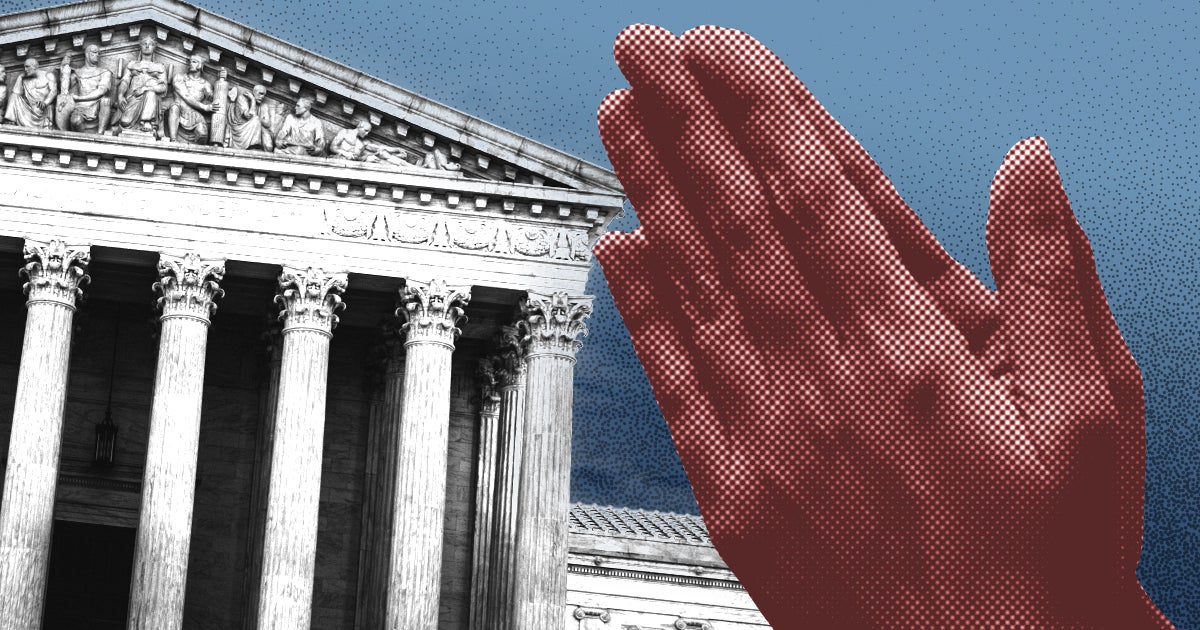
by Maaike Duininck & Jorge Gomez • 4 minutes
The end of the U.S. Supreme Court term is fast approaching. By June 30, the Court is expected to rule on three major religious freedom cases—including a First Liberty case that could impact the civil liberties of all Americans.
We’ve seen tremendous momentum for religious liberty in recent terms. The landmark Supreme Court victories that First Liberty secured for Coach Kennedy, the parents in the Carson v. Makin case, and our Faithful Carrier Gerald Groff brought a seismic shift in the law favoring religious expression.
Will 2025 be another historic year for religious freedom? Each of the following cases presents a tremendous opportunity to set a precedent that would protect millions of Americans.
Protecting Americans’ Right to Fight for Their Religious Liberty in Court
Right now, the nation’s highest court is deliberating whether to hear our case involving Gabriel Olivier, who was prohibited from sharing his faith in a public park.
Gabe is an evangelical Christian who shares the Gospel outside of well-attended events, hoping to start conversations and reach as many people as possible.
But the City of Brandon, Mississippi enacted an unconstitutional ordinance that bans Gabe from communicating his religious beliefs to others in a city park. They forced him to go to a remote “protest” area where his message can’t be heard or seen. He was arrested and fined when he didn’t stay there.
Gabe challenged the local ordinance in federal court. But the court dismissed his constitutional claim, without even considering the merits of it. He was effectively denied his day in court.
First Liberty asked the U.S. Supreme Court to hear the case. Gabriel’s case received support from a diverse coalition of organizations that filed 11 friend-of-the-court briefs explaining why the justices should take the case.
As a nation built on religious freedom, the First Amendment protects your right to share your faith in a public park. No American should be arrested or charged for doing so. But if that were to happen—as it did with Gabe—you should be able to have your day in court and plead your case.
Please continue to pray for the Supreme Court justices as they deliberate. The stakes in this case couldn’t be any higher. The outcome of this case could impact the religious liberty, free speech and due process rights of all Americans.
Ensuring Charities and Nonprofits Can Keep Serving the Most Vulnerable
The Court will issue an opinion in the coming weeks in a case involving Catholic Charities Bureau (CCB), a nonprofit ministry that’s being forced to pay taxes because, according to the state, it is not sufficiently religious.
The Wisconsin Supreme Court ruled that Catholic Charities could not receive a religious exemption from the state’s unemployment compensation program. The state court held that CCB didn’t meet the religious requirements of, “involving religious worship, education, or the active sharing of religious faith.” It also stated that the ministry was not, “operated primarily for religious purposes.”
First Liberty filed a friend-of-the-court brief in support of CCB arguing that the U.S. Supreme Court should reverse the Wisconsin Supreme Court’s ruling. We explained that CCB is carrying out the mission of the Catholic Church to help those in need.
Organizations like CCB play a major role in serving communities and aiding the most vulnerable among us. The outcome of this case could set an important precedent that protects longstanding tax exemptions for faith-based nonprofits. This will impact ministries and charitable organizations across the country that make an incredible, life-changing impact in the lives of millions of people.
Protecting Parents’ Right to Decide What’s Best for Their Children
In Mahmoud v. Taylor, the Court will rule on whether parents have the constitutional right to opt their children out of educational programs at odds with their faith.
An interfaith coalition of Catholic, Protestant, Orthodox Christian and Muslim parents argue that they have a right to know what their children are being taught in school. They requested notification and opt-outs from materials teaching radical gender ideology in the classroom. But the Montgomery County Board of Education in Maryland denied their requests.
First Liberty filed a friend-of-the-court brief supporting the parents. We explain that the Supreme Court has long recognized the rights of parents to direct the religious upbringing of their children. More than 50 organizations also filed briefs in support of the parents.
First Liberty recently obtained an early victory in a similar case for two families in California whose children were required not only to read a book which made them question their gender, but also to teach the book to younger reading buddies and “choose” their gender. The school district denied the parents’ requests to provide notice and opt-outs when their kids were being taught these materials and forced to teach them. A federal district judge ruled in favor of our clients, which means young students won’t be forced to read or affirm materials in violation of their faith, while the case proceeds in court.
There is perhaps no right more deeply rooted in our nation’s history and tradition than the right of parents to direct their children’s religious upbringing. Even so, we’re witnessing attacks on parental rights and religious freedom all over the country.
The Supreme Court decision won’t just impact parents in one Maryland county. It could have massive implications for families nationwide. The outcome could impact religious liberty and parental rights for decades to come.